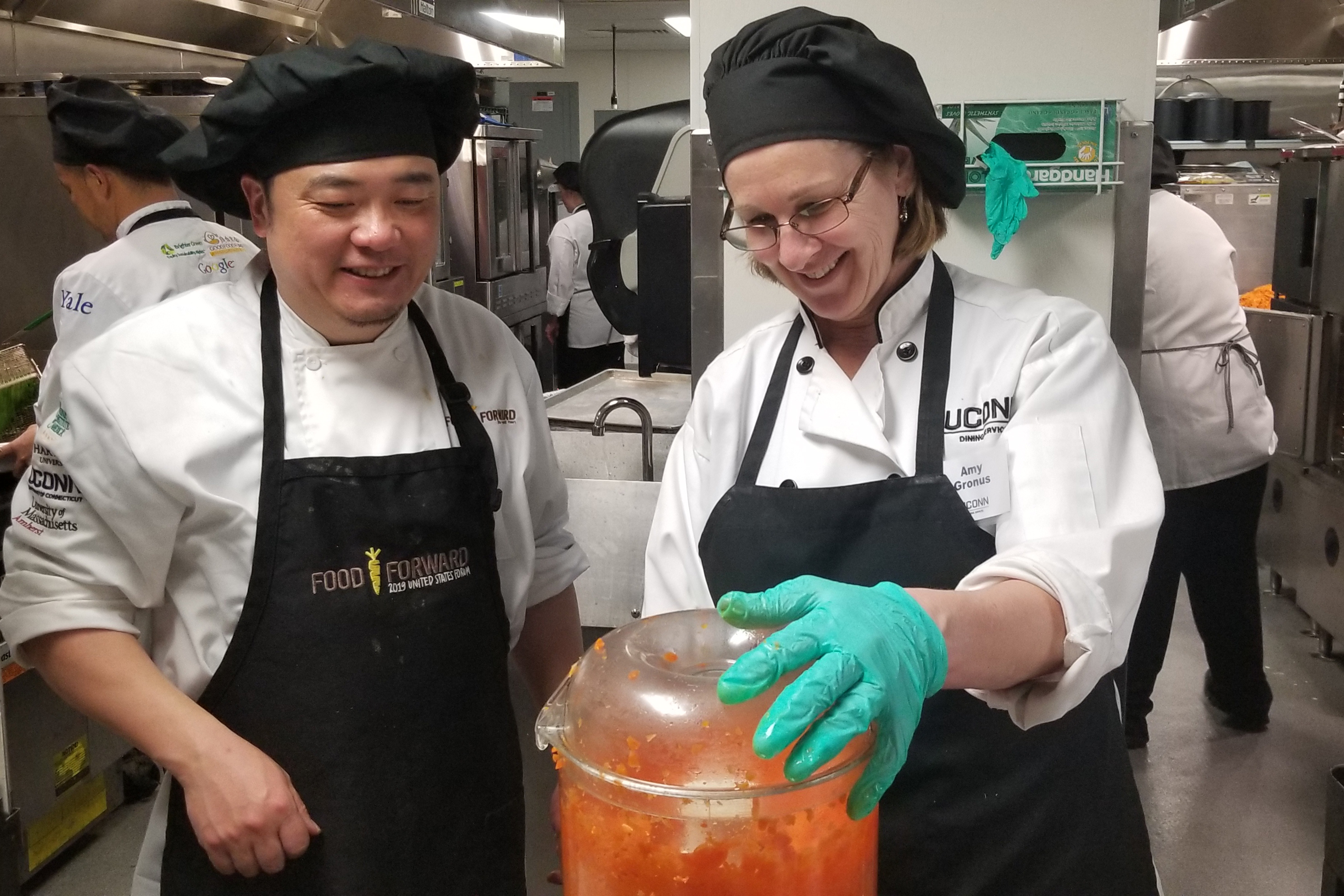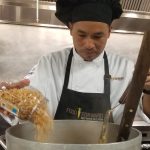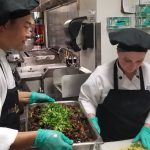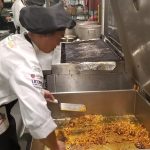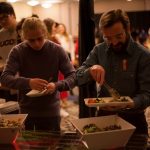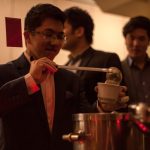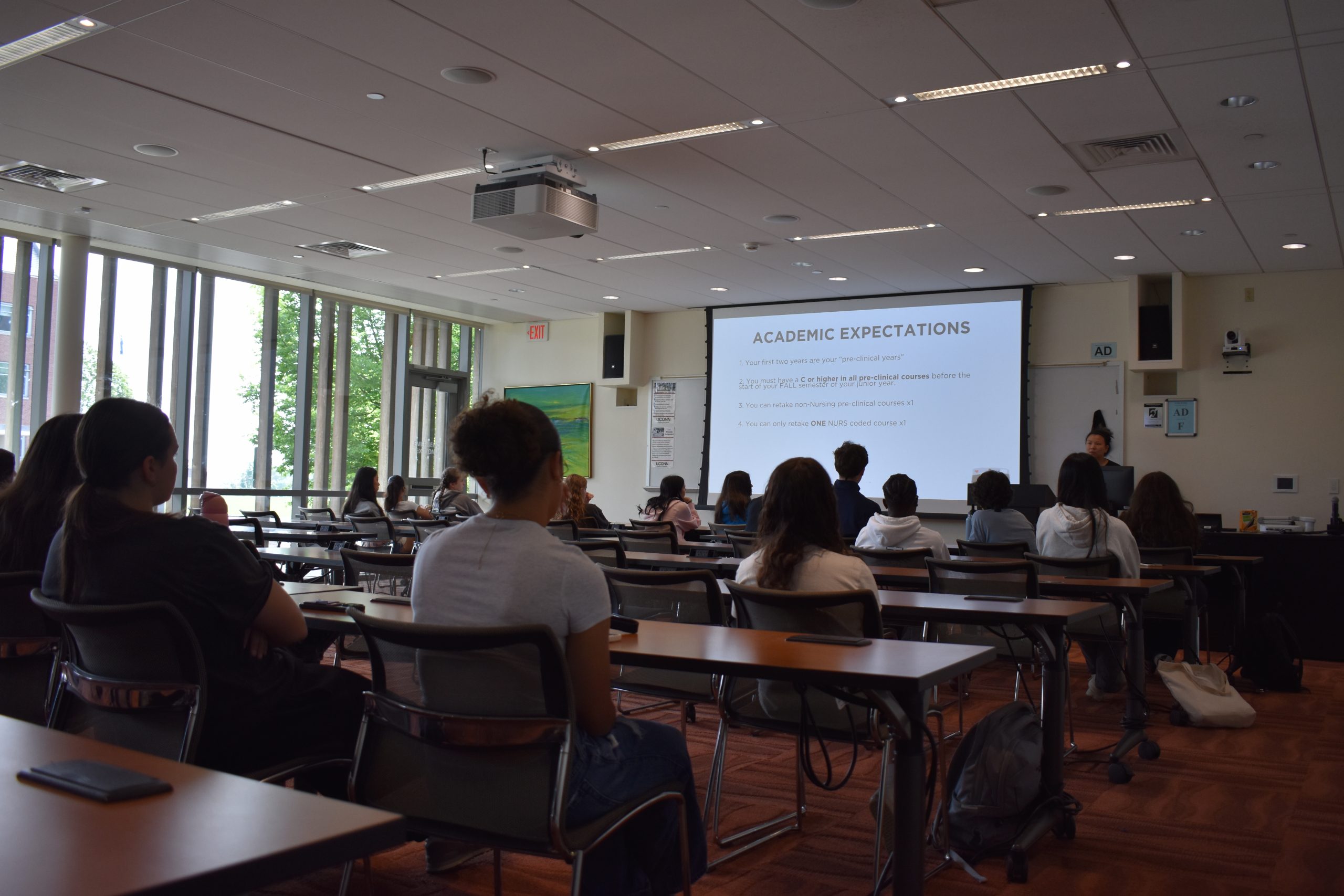When UConn chefs were preparing the dishes for a special celebration of Chinese New Year, they had expert mentors to help them get the recipes right. Chefs from China, on campus for a two-day visit, worked side by side with them, instructing their UConn counterparts and demonstrating the new techniques. But first, Dining Services staff had to go shopping for some unusual ingredients. And before they could do that, they needed a translator.
The event and the visit to Storrs were part of a cultural exchange with a group of seven Chinese chefs, led by Yi Jian, president of the Food Forward Forum, and joined by several business leaders and two journalists. Their U.S. tour included Yale, Harvard, UMass, and the Culinary Institute of America (CIA).
The Chinese delegation came to learn how U.S. universities promote plant-based menus on their campuses. In return, the Chinese chefs wanted to share new and unusual recipes with their American counterparts.
Their stay in Storrs included seminars, demonstrations, and shared kitchen time for the two groups, culminating in a Chinese New Year gala at the Rome Commons Ballroom prepared for the UConn community. Guest included UConn faculty, staff, and students – a number of them Asian or Asian-American.
The visit to UConn was initiated when UConn Dining Services executive director Dennis Pierce met Yi at a Food Forward event at the Culinary Institute last summer.
“The bottom line is that we are all moving toward a more healthy plant-based diet,” says Pierce, “and we are getting away from traditional college food. We have a great influence on the students, as they can create good, healthy eating habits that are with them for the rest of their lives.”
Pierce says the UConn chefs got exposure to traditional Chinese items that are not typical American-Asian food. “Their typical exposure is traditional college food service, and now they have had this wonderful opportunity to meet these master chefs from China and work side-by-side with them.”
Yi did not grow up in the culinary world. A teacher and film maker by trade, who earned his master’s degree in the U.S., he was teaching at the Communication University of China in Beijing when he traveled to New York 10 years ago to help make a short film on the impact that meat consumption has on the environment. The experience changed the course of his life.
“There has been an incredible increase in meat consumption over the past two decades in China,” says Yi. “People can’t cook without it. It’s a sign of prosperity. Traditionally, cows were precious. They were treated like part of the family, and used for plowing and farming.”
The problem, he says, is that the meat-eating habit is not sustainable for his country.
“We have 1.4 billion people … We are the second-largest economy in world,” he notes. “If the average Chinese person ate like the average American in terms of meat, there will be no Earth, no future. We have finite resources.”
After making the film, Yi began to follow a vegetarian diet, and eventually a vegan one. Until then, he loved meat. “I literally ate lard like it was ice cream,” he says.
His goal is not for the Chinese population to go to the extreme he did in terms of diet, but simply to eat less meat and animal-based food, and move to more plant-based foods.
The chefs selected for this tour, however, were not those already cooking vegan dishes. “They are all mainstream,” Yi says. “We are not asking everyone to become vegan, don’t get the wrong idea. We want people to reduce their reliance on animal protein.”
The challenge to the chefs is to make healthy and sustainable food enticing and appetizing. For instance, the menu for the Chinese New Year dinner was 85 percent plant-based, with fish and eggs used as well.
The chefs from UConn and China were busy most of Monday and Tuesday preparing the menu for Tuesday night. Two of the dishes taught to the UConn staff were a vegan “crab”-stuffed orange and vegan braised “meatballs.”
UConn culinary operations manager Rob Landolphi says a UConn member of staff who could read Chinese helped translate the recipes, so the group could shop for ingredients.
The experiences of the past couple of days have built a bond between the Chinese chefs and their UConn counterparts.
“That is how you truly engage people,” says Yi, “in conversation and at a personal level. You talk face-to-face and that is where change happens. … Now is the moment we need to come up with a new culture that will give our children and grandchildren a future.”
